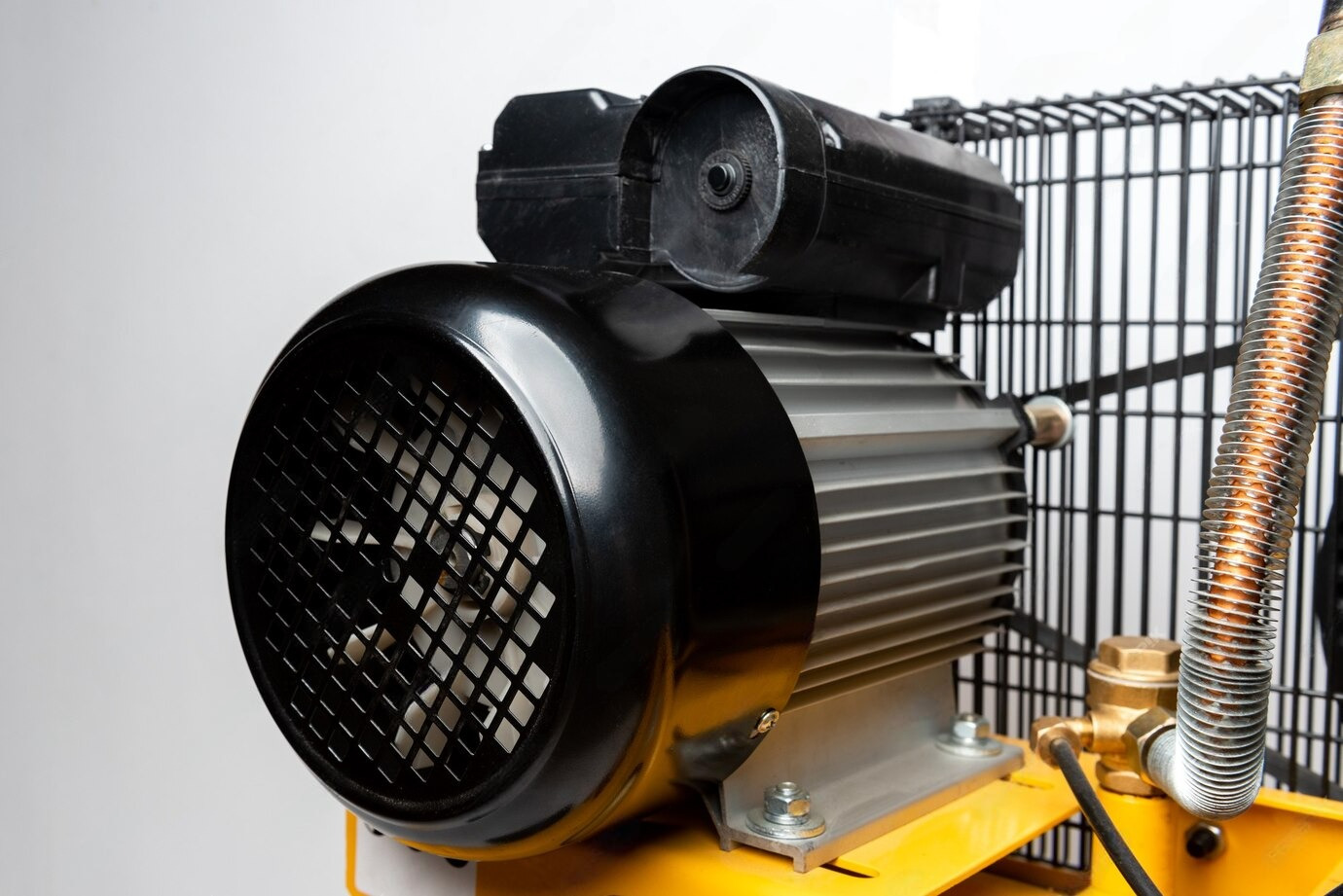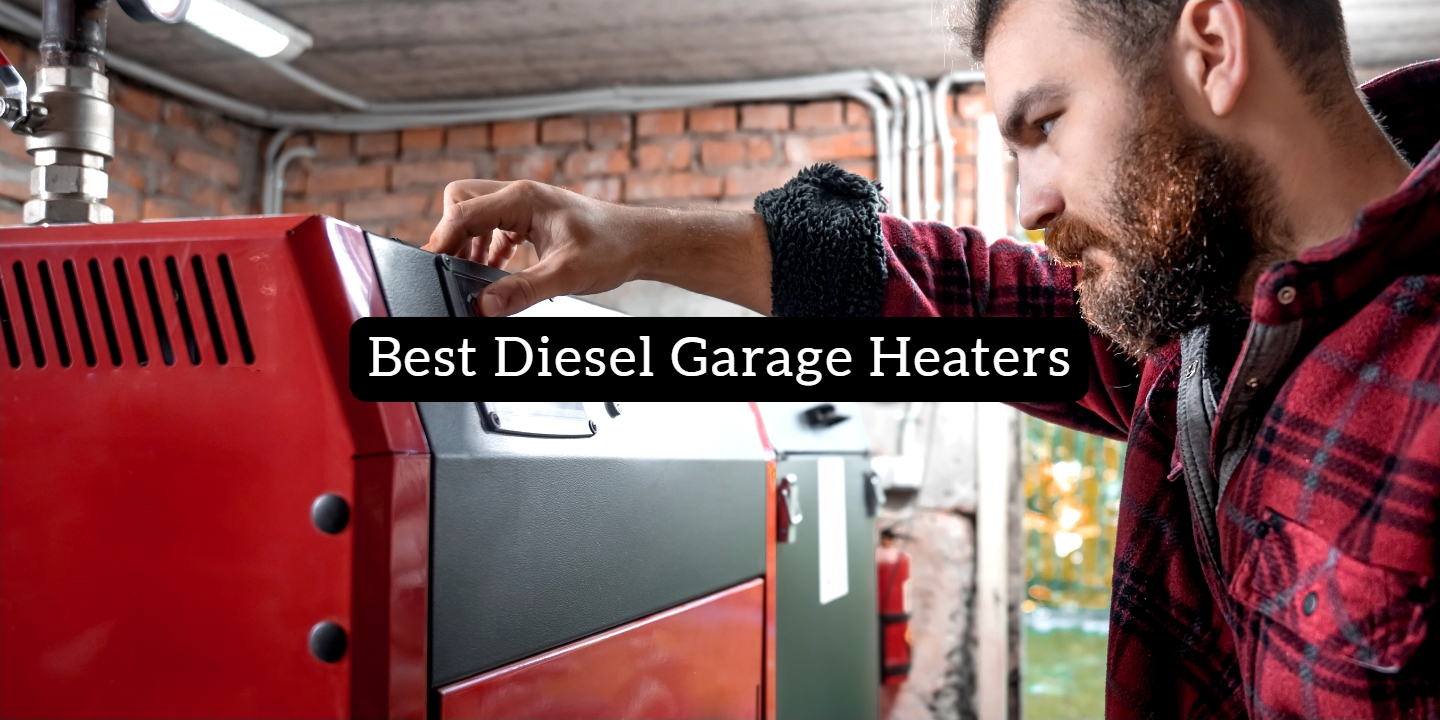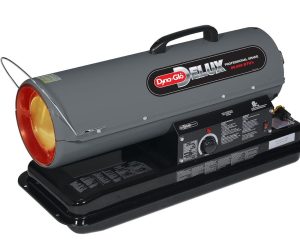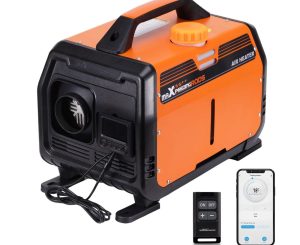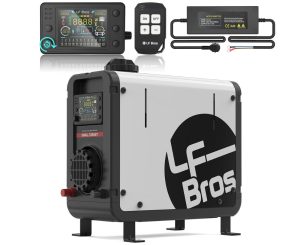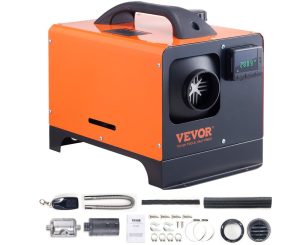Winter’s icy grip can turn your beloved garage into a frozen wasteland, rendering tinkering, projects, and even car maintenance a bone-chilling affair. And salvation awaits in the form of trusty diesel heaters.
We’ve got the scoop on the best diesel garage heaters you could try. These portable heaters can turn your space into a haven of warmth for any kind of work that needs to be done.
We’ll delve into the nitty-gritty, exploring vital factors and, of course, that all-important price tag. Not all models are made equal, and it’s essential to weigh all the aspects before purchasing. Let’s get started!
Dyna-Glo Delux KFA80DGD
This isn’t your average space heater. This burly beast boasts 80,000 BTU of forced-air heat, making it ideal for battling the cold in large spaces like garages, workshops, and construction sites. But before you unleash its fiery fury, let’s see if it’s the right fit for you.
Pros:
- Powerful punch: 80,000 BTU heat output warms up even large spaces quickly and efficiently.
- Fuel flexibility: Runs on various fuels like kerosene, diesel, and even jet fuel, offering adaptability and convenience.
- Portable powerhouse: Built for easy movement with a handle, making it ideal for various heating needs.
- Safety features: Includes a flameout sensor and overheat shut-off for peace of mind.
- Relatively affordable: Offers impressive heating power at a competitive price point.
Cons:
- Earsplitting roar: The noise level can be unbearable for some, disrupting activities and conversations.
- Moisture monster: Requires proper ventilation to avoid moisture buildup and potential damage.
- Safety first, always: Improper ventilation can lead to dangerous carbon monoxide buildup.
Think Twice If:
- Peace is your priority: This heater is LOUD. The roar of the burner can be disruptive, making it unsuitable for quiet spaces or proximity living.
- Moisture is a concern: Kerosene heaters produce moisture, which can be an issue in tightly sealed spaces. Consider using a dehumidifier or ensuring proper ventilation to avoid moisture buildup.
- Safety is non-negotiable: This heater requires proper ventilation to function safely. Never use it in enclosed spaces or without adequate fresh air circulation. Always follow the manufacturer’s safety guidelines.
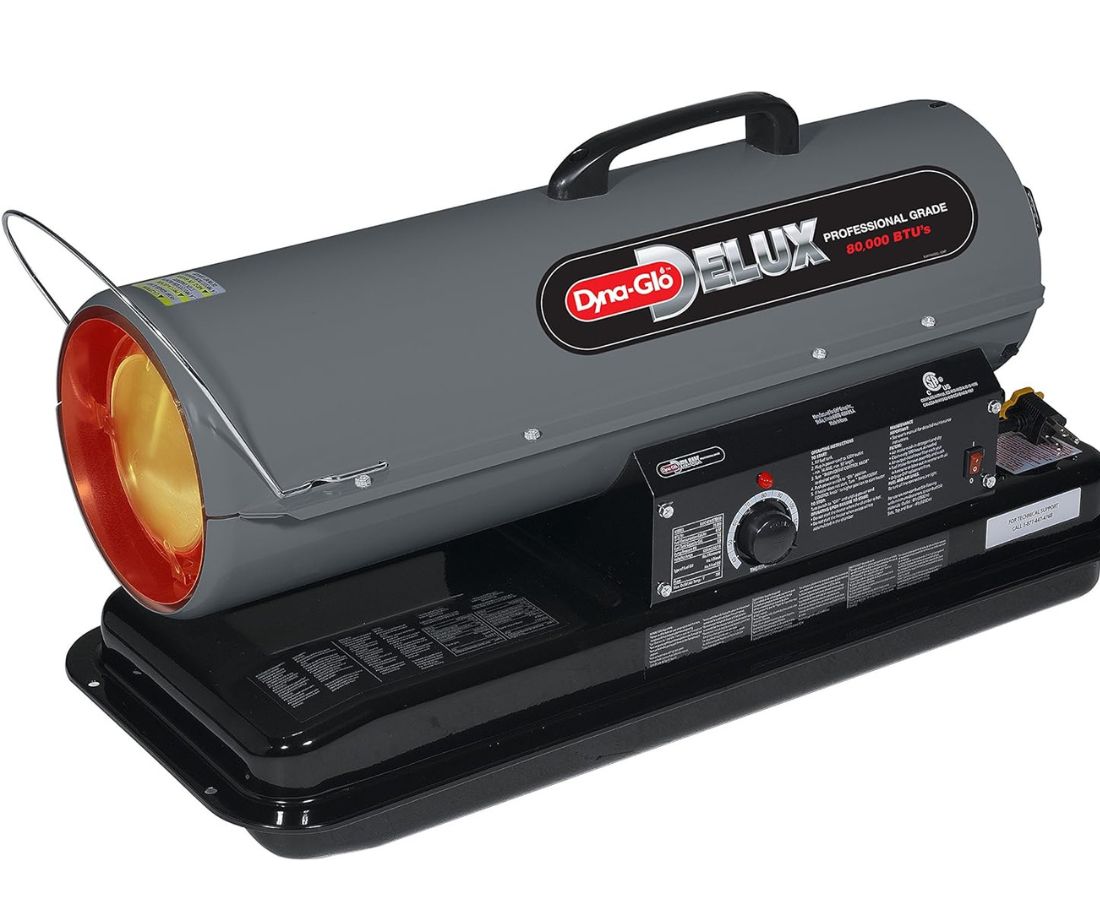
You may also like: 7 Quietest Garage Heaters
maXpeedingrods Diesel Heater
Here’s a budget-friendly option for heating small spaces. The included accessory kit is more comprehensive than some competitors, and the heater itself can be modified with some technical know-how. But if you’re considering this model, budget for additional safety measures like a muffler and proper fuel line replacement. Research and understand the necessary modifications before installation. So before you jump in, let’s dissect its pros, cons, and who it might suit best.
Pros:
- Affordable: Compared to other diesel heaters, it offers decent value for money.
- Decent power: Heats spaces up to 2kW, suitable for small to medium-sized areas.
- Upgraded accessory kit: Includes more accessories and higher quality components compared to older models.
- DIY potential: Can be modified with technical expertise to improve functionality.
Cons:
- Basic controller: Lacks the features and ease of use of more advanced models.
- Unclear instructions: Requires technical know-how for safe installation and operation.
- No muffler: Requires additional purchase and installation for safety compliance.
- DIY modifications needed: May need adjustments to ensure proper combustion air intake and exhaust connections.
- Fuel line concerns: The green fuel line included is recommended to be replaced for safety reasons.
Think twice if:
- User-friendliness is key: The lack of clear labeling on the unit and the basic controller can be confusing for beginners. Upgrading the controller requires significant technical expertise.
- Safety is non-negotiable: The absence of a muffler and concerns about the green fuel line raise safety concerns. Modifications might be necessary for safe operation.
- Noise bothers you: While not the loudest, diesel models inherently produce noise. Consider your noise tolerance and surrounding environment.
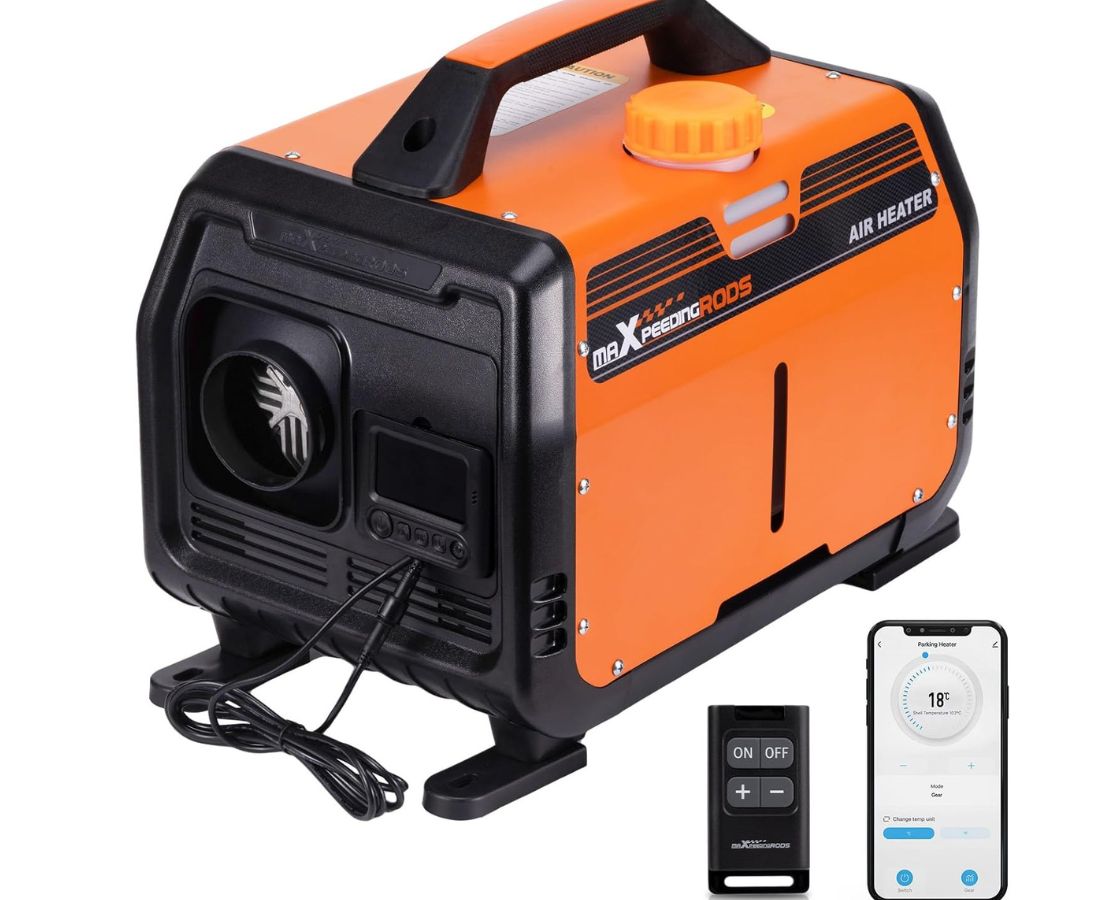
ChuBu Diesel Heater
It’s a budget-friendly warmth on the go but comes with caveats. If you consider this model, research and implement additional safety measures to address overheating concerns. Ensure proper installation with all necessary components, and be prepared for potential modifications based on user reports. Be prepared for some DIY troubleshooting and consult technical resources if needed. Remember, warmth shouldn’t come at the cost of safety.
Pros:
- Quick heating: Provides warmth within minutes, ideal for chasing away chills quickly.
- Powerful: 5KW output effectively warms small to medium-sized spaces like vans, boats, and car garages.
- Remote control: Adjust temp and preheat remotely for a cozy arrival.
- Low fuel consumption: Offers extended use without breaking the bank on fuel costs.
- Quiet operation: The silencer helps minimize noise, making it suitable for enclosed spaces.
- Versatile application: Heats various vehicles, boats, and even garages, providing winter comfort on the go.
Cons:
- Overheating concerns: Reported overheating issues demand caution and potentially additional safety measures.
- Incomplete hose clamps: Missing hose clamps for specific connections might require additional purchases.
- Unclear controls and manual: Confusing controls and a limited manual can make operation challenging for beginners.
- Unpleasant odor: Some users find the heater’s odor strong and unpleasant, especially in enclosed spaces.
Think twice if:
- Ease of use is your priority: This heater’s controls and manual have been criticized for being confusing and lacking information. Be prepared for some trial and error.
- Safety is non-negotiable: Users report overheating issues, requiring close monitoring and potentially additional safety measures.
- The smell is a dealbreaker: Some users find the odor produced by the heater unpleasant and overwhelming, especially in small spaces.
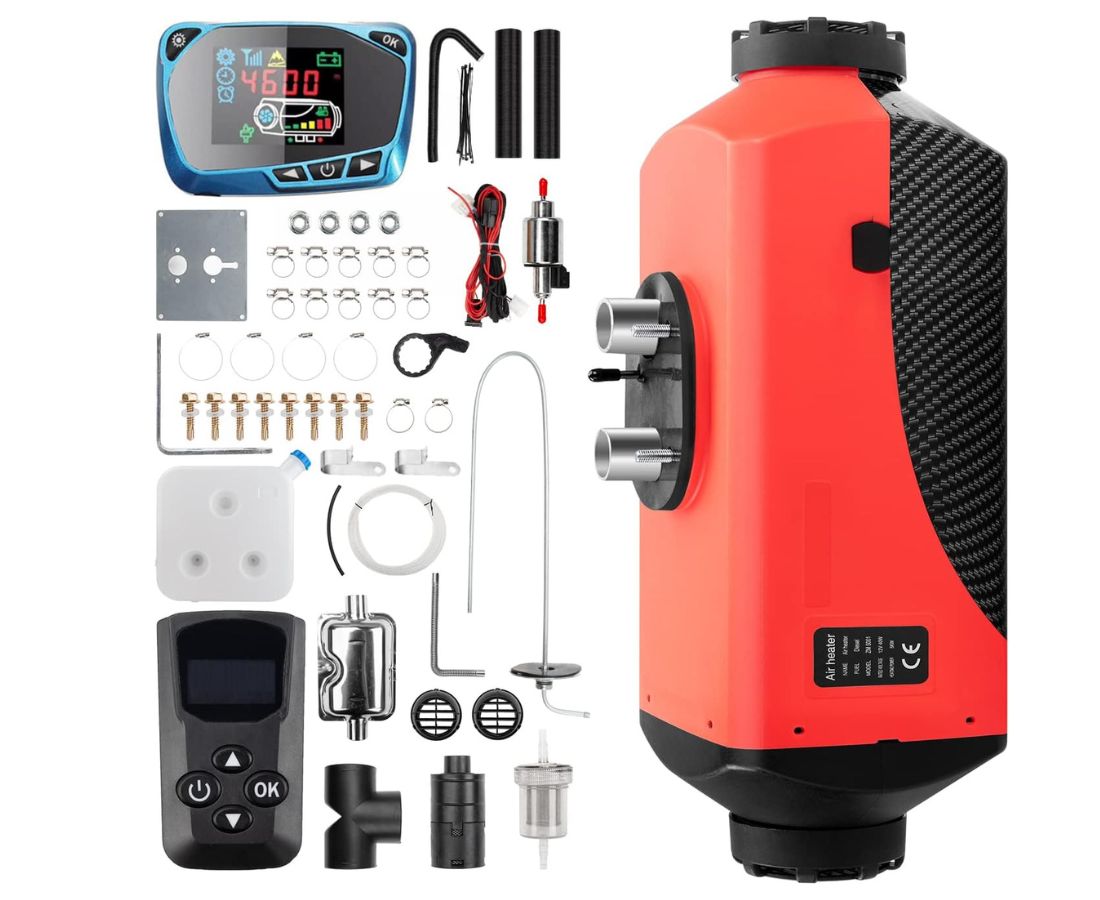
Check also: Garage Heaters Placement Rules (Electric, Propane, Infrared)
VEVOR 8KW Diesel Heater
This one isn’t just a heat source; it’s a ticket to toasty adventures, promising warmth on demand for your outdoor escapades. It boasts portability and affordability, prioritizing safety and managing expectations is crucial. When it comes to this model, think of buying additional safety measures like a smoke detector, and consider alternative heating options for larger spaces or when battery conservation is crucial.
Pros:
- Plug-and-play convenience: No installation required, perfect for spontaneous adventures.
- Decent heating power: Heats medium-sized spaces like vans, boats, and cabins effectively.
- Fuel efficiency: Low-noise pump keeps fuel consumption moderate, offering up to 8 hours of warmth per tank.
- Dual control: Remote and LCD screen for convenient temperature adjustment and preheating.
- Wide operating range: Functions well in diverse environments, from -40°F to 104°F and up to 9843ft altitude.
- Safety features: Includes overheating protection, constant temperature control, and a timing function.
Cons:
- Reported malfunctions: Random shutdowns and overheating require close monitoring and potential troubleshooting.
- Lower heat output than expected: Might not be sufficient for larger spaces or intense heat needs.
- Continuous fan operation: Drains battery in smaller setups and might be noisy for some.
- Unburned fuel smoking: Reported instances after shutdowns raise safety concerns.
Think twice if:
- Reliability is a priority: Reports of random shutdowns and overheating raise safety concerns. Be prepared for potential troubleshooting and close monitoring.
- You expect furnace-like intensity: While powerful for its size, the heat output might not match heavy-duty electric heaters, especially in larger spaces.
- Battery conservation is crucial: The continuous fan operation, even after reaching the desired temperature, can drain your battery in smaller setups.
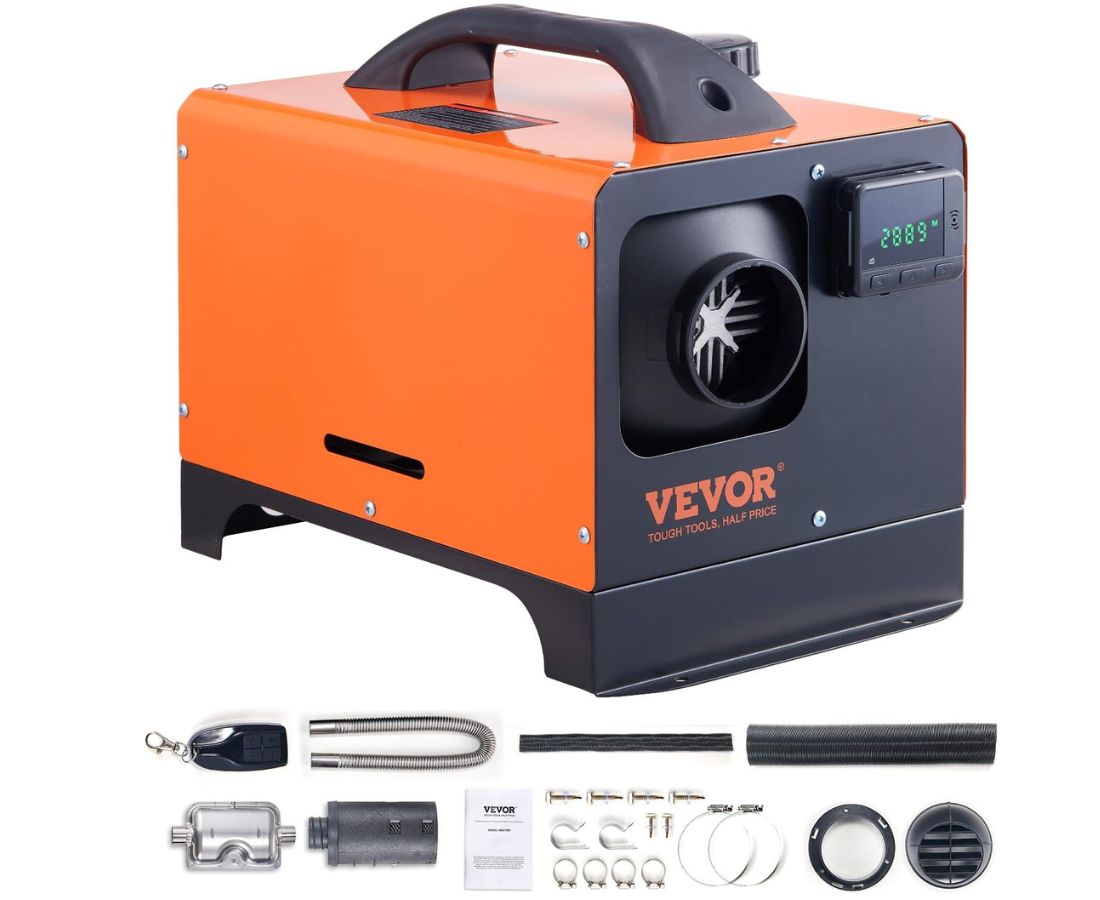
LF Bros Diesel Heater
This model promises toasty comfort in various environments with its compact size and multi-voltage compatibility. Before setting sail on your winter adventure, research potential workarounds for missing parts, consider investing in additional safety measures like a smoke detector, and explore alternative heating options if durability or precise temperature control is crucial.
Pros:
- Compact size: Easily fits in limited spaces, making it suitable for vans, boats, and garages.
- Multi-voltage compatibility: Works with 12V/24V DC and 110V AC power sources, offering flexibility in different environments.
- Easy timer control: Set heating time for convenience and energy savings.
- Oil leak-proof design: Internal thread fuel tank cover minimizes spills during travel.
- Delicate packaging: Protects the heater and accessories for storage and transportation.
Cons:
- Missing installation parts: Instructions depict parts not included in the kit, requiring additional purchase and potentially compromising safety.
- Flimsy cord and power brick: Raise concerns about durability and availability of replacements.
- Limited user manual: Lacks crucial information on settings and operation, potentially confusing for beginners.
- No automatic temperature control: Requires manual shut-off or timer setting, potentially leading to overheating.
Think Twice If:
- Complete Reliability is Paramount: Missing parts and unclear instructions raise concerns about user experience and potential safety issues.
- Durability is a Major Concern: The reported flimsiness of the power supply could be a dealbreaker for long-term use.
- Automated Comfort is a Must-Have: The lack of auto-shutoff might not suit those seeking hands-off temperature control.
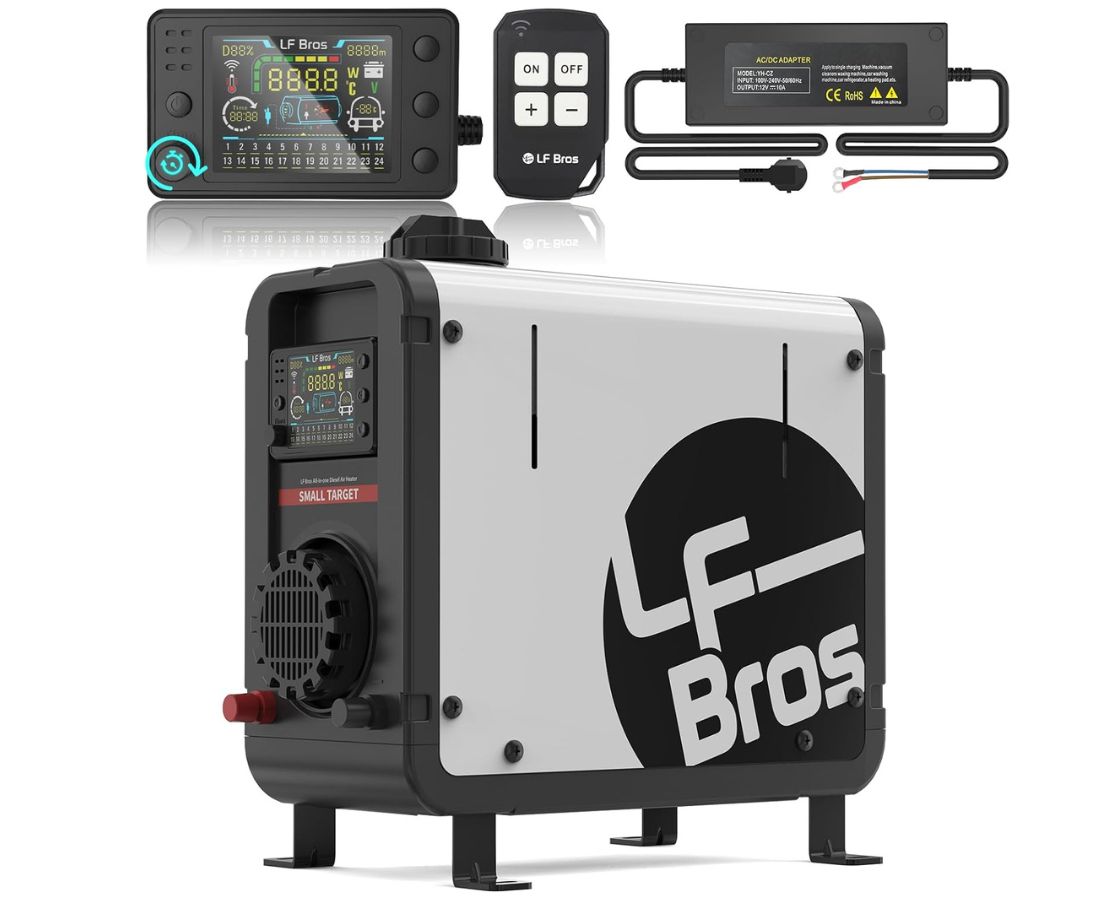
Have a look at: 7 Best Comfort Zone Garage Heaters
VEVOR Diesel Heater
This all-in-one model packs a punch with its 8KW of heating power, effectively warming medium to large spaces. Operating seamlessly across a wide temp range of -40°C to +50°C, this climate conqueror laughs in the face of extreme weather. With it, you can enjoy extended warmth without frequent refilling, making longer journeys more cost-effective and eco-friendly. It’s best to search for unclear instructions, consider noise-canceling headphones if needed, and explore alternative heating options if absolute silence is a priority.
Pros:
- Compact and Powerful: Heats large spaces efficiently without bulky equipment.
- Versatile Climate Control: Handles extreme temperatures for year-round comfort.
- Fuel-Saving: Low consumption rate reduces costs and extends travel range.
- Convenient Control: Remote and LCD panels offer easy temperature management and pre-heating.
- Affordable: Budget-friendly option compared to other heaters.
Cons:
- Unclear Instructions: Deciphering the manual might require technical skills and patience.
- Not Silent: Expect a noticeable hum during operation, not ideal for absolute quiet.
- DIY Reliance: Installation seems simple, but troubleshooting unclear instructions might be challenging.
Think Twice:
- Instruction Deciphering Experts: The instructions might be unclear, requiring technical know-how for setup and troubleshooting.
- Silence Seekers: While not deafening, this heater generates noticeable noise.
- Tech-Timid Individuals: Comfort with basic troubleshooting and technical manuals is recommended.
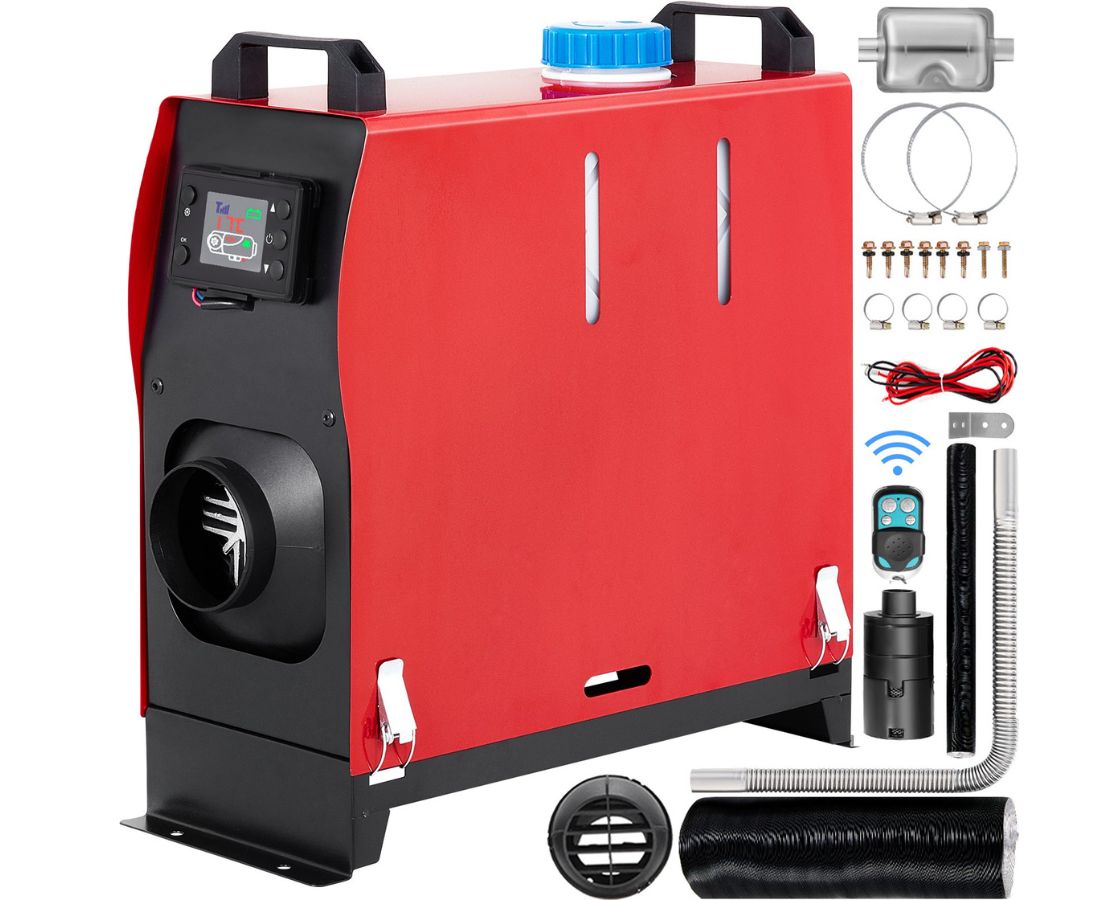
You may also check: 7 Best 120V Heaters for Garage
Remington Diesel Heater
This model roars onto the scene, promising to conquer even the chilliest of spaces with its 80,000-BTU firepower. Fueled by diesel or kerosene, it boasts heavy-duty construction and rapid heat output. It’s a nice option for large, well-ventilated spaces and rapid heating are undeniable asset.
Pros:
- Blazing Heat: This heater packs a serious punch, effectively warming even large spaces in record time. Say goodbye to shivering in your garage or workshop!
- Fuel Choice: The option to use diesel or kerosene provides flexibility and convenience, allowing you to choose based on availability and preference.
- Durable Design: Built to withstand demanding environments, the Remington promises long-lasting performance in tough conditions.
Cons:
- Space Hog: The large footprint and safety clearances limit its suitability for smaller spaces.
- Scorching Surfaces: The extremely hot housing requires caution and vigilance to avoid burns.
- Overheating Potential: The intense heat might be overwhelming for smaller spaces or those seeking more moderate warmth.
Think Twice If:
- You Have Small Space: This heater isn’t for the faint of heart (or small spaces). Its powerful output requires a minimum clearance of 10 feet from combustibles and a 3-4 foot safety radius. In tight spaces like garages, consider alternative options.
- Scorching Surfaces: The housing gets extremely hot during operation, posing a potential burn hazard. Exercise caution and keep children and pets at a safe distance.
- Fiery Intensity: The intense heat might be overwhelming in smaller spaces or for those seeking more moderate warmth. Consider your specific needs and comfort level before diving in.
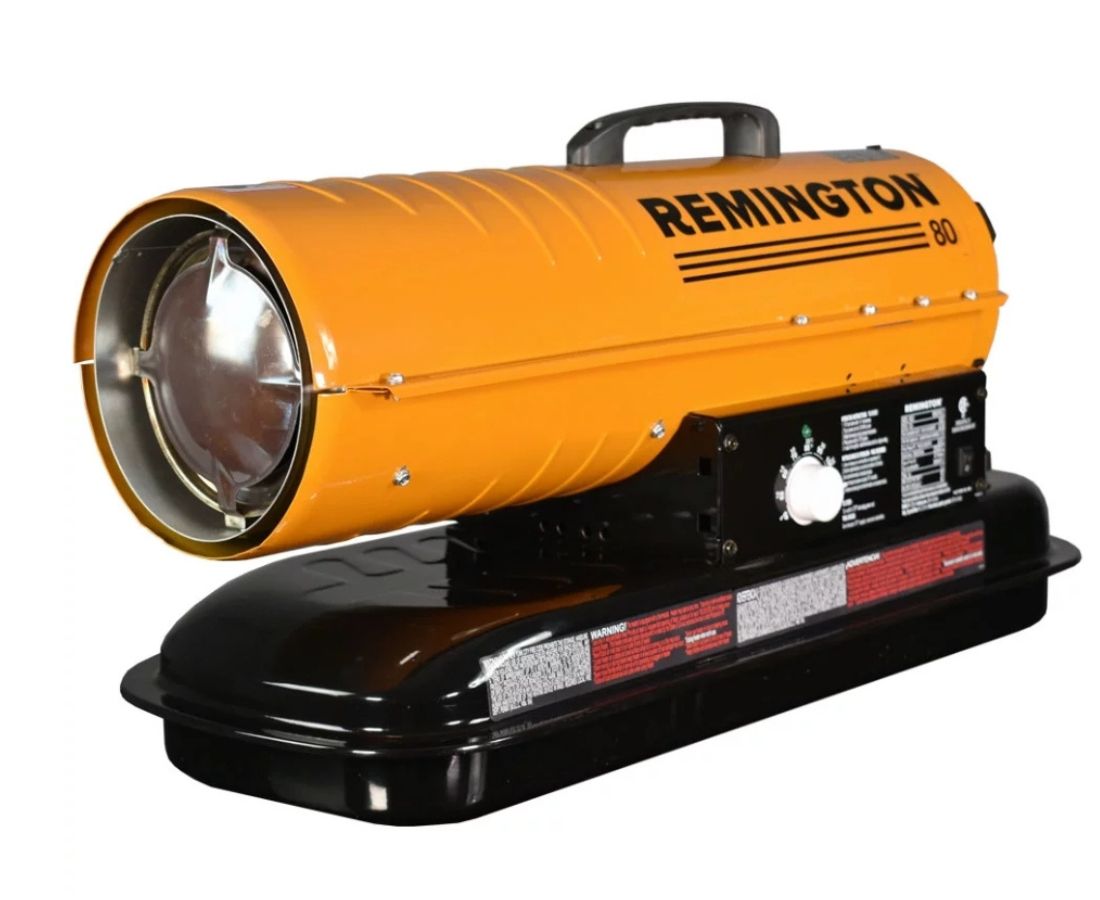
FAQ
Do diesel heaters use a lot of electricity?
Such models only require a minimal amount of electricity for operation. This typically involves the glow plug for ignition, fan motor, and control unit. So, while they do use some electricity, it’s significantly less compared to an electric heater generating the same amount of heat.
Is a diesel heater cheaper than an electric one?
In general, for long-term heating in larger spaces, especially where electricity costs are high, diesel heaters can be cheaper than electric heaters. However, for shorter durations or smaller areas, electric heaters might be more cost-effective due to their lower upfront cost and minimal electricity use.
Are diesel heaters safe?
When installed and used properly, diesel heaters are generally safe. However, they do come with inherent risks compared to electric heaters:
- Fumes: They produce exhaust fumes containing carbon monoxide, which can be dangerous if not properly vented to the outside. Proper ventilation is crucial to avoid carbon monoxide poisoning.
- Fire hazard: Like any combustion appliance, they have a potential fire risk if not handled properly. Ensure proper installation, operation, and maintenance to minimize this risk.
- Fuel storage and handling: This fuel is flammable and requires safe storage and handling to prevent spills and leaks.
